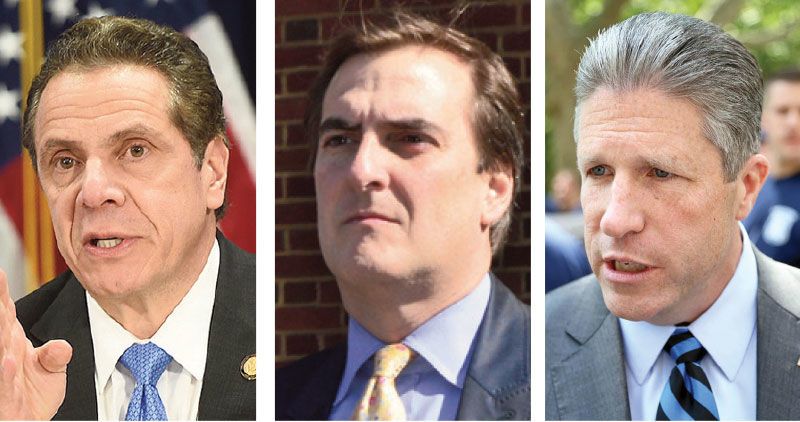




 GOVERNOR CUOMO: The real solution is Federal.
GOVERNOR CUOMO: The real solution is Federal.
MICHAEL GIANARIS: Special license plate embarrassing.
PATRICK LYNCH: Need cops in all city schools.
In the wake of the killing of 17 students and Teachers at a Florida high school last month, Democrats in the State Assembly believe they have the solutions to protecting New York schools from similar attacks. Republicans in the State Senate have their own solutions.
This being Albany, it’s very possible that never the twain shall meet.
Different Goals
The two chambers passed a total of 20 bills at the beginning of last week. The Senate bills focus on protecting schools, particularly putting armed adults inside. The Assembly bills would limit access to weapons, strengthening background checks and allowing judges to block certain people from possessing them.
Governor Cuomo, who forced the SAFE Act through the Legislature in 2013 after 20 first-graders and six adults were killed in a Connecticut school by a mentally-ill man with his mother’s rifle, has mostly stayed out of the debate, focusing on the need for changes in Federal laws.
"We support further strengthening the strongest gun-safety laws in the country,” said his spokesman Richard Azzopardi, referring to the SAFE Act, “and look forward to discussing proposals to do this with the Assembly and Senate. But, as the Governor said, to most-effectively curb gun violence we need Federal action, and the lack of Federal action on this is alarming.”
The Senate legislative package included a bill from Patrick M. Gallivan, a former State Trooper and Erie County Sheriff, to hire school-resource officers—defined as active or retired Police Officers, Sheriff’s Deputies or State Troopers—who are specifically authorized to carry weapons in schools. Districts could do their own hiring or contract with the state, and would receive up to $50,000 a year from the state as reimbursement.
Could Cost $1.2B
New York City is specifically exempted from the reimbursement provision but not the rest of the bill. Mayor de Blasio has opposed requiring an officer to be assigned to each school, noting that the city has 1,400 of them and the annual cost could be $1.2 billion.
Patrick J. Lynch, the Patrolmen's Benevolent Association's president, said he supported having officers in all city schools. "Each attack on a school makes it clearer that we need a sufficient number of fully-trained and -equipped police officers positioned to respond immediately and neutralize the threat,” he said in a statement. “In active-shooter incidents, every passing minute means further loss of life.”
The Senate approved a separate bill requiring that an officer be assigned to every city school—both public and private—that was sponsored by Simcha Felder, a Senate Democrat who like the Independent Democratic Conference caucuses with Republicans to give them control of the body. The officer would be at the school from one hour before instruction starts until on hour after it ends.
The state School Boards Association said that it would support state funding for school-resource officers but that state reimbursement should be extended to the city.
'Embarrassing'
Other bills passed by the Senate would provide up to $50,000 per district for hiring a mental-health-services staffer who would try to identify people with issues before they start shooting, expand active-shooter drills at schools, provide more funding for metal detectors and scanners, and strengthen penalties for violent crimes and threats on school grounds.
Senators also approved a new “Guardians for Schools” vanity license plate, the $25 fees for which would go to school-security programs. Democrats criticized it as a solution to school shootings. “A bill to offer a distinctive license plate?” asked Sen. Michael Gianaris of Queens. “Can we be any more embarrassed?” But sponsor James Tedisco, a Schenectady Republican, said it would help alleviate a situation where legislative offices have metal detectors but public schools don’t.
The Senate rejected a proposal by a Long Island Democrat, Todd Kaminsky, to ban arming teachers in their classrooms, a solution proposed by President Trump among others. It also defeated broader gun-control measures.
One of the bills passed by the Assembly would create an “extreme-risk protection order” to be signed by a judge prohibiting people deemed to be a risk to themselves or others from possessing firearms. Another would extend from three days to 10 days the amount of time someone must wait to purchase a weapon if a Federal background check is not completed.
‘Bump Stock’ Ban
A third would ban “bump stocks,” devices that can modify single-shot rifles to fire multiple-round bursts. Several other sites have passed similar bans. A bump stock ban appeared to gain traction in Congress until some Republican leaders, including Mr. Trump and Attorney General Jeff Sessions, said the solution should be regulatory, not legislative. The Florida shooter did not use a bump stock, but a man who killed 58 people and wounded 156 from a Las Vegas hotel-room window in October did.
Statements from leaders of the Senate and Assembly underscored their different approaches.
“We must act swiftly and decisively to implement additional measures in schools throughout our state to give students, parents, and teachers the resources and peace of mind that they deserve," said Senate Majority Leader John Flanagan.
Assembly Speaker Carl Heastie said his house’s legislation would help keep weapons out of the hands of potential school shooters. “The point we’re trying to make is that more guns on top of students is not the answer,” he said, referring to the Senate’s armed-officers-in-schools bills.
Albany insiders said the bills would not be part of the standard three-way negotiations with Mr. Cuomo to settle the state budget, which is due April 1.